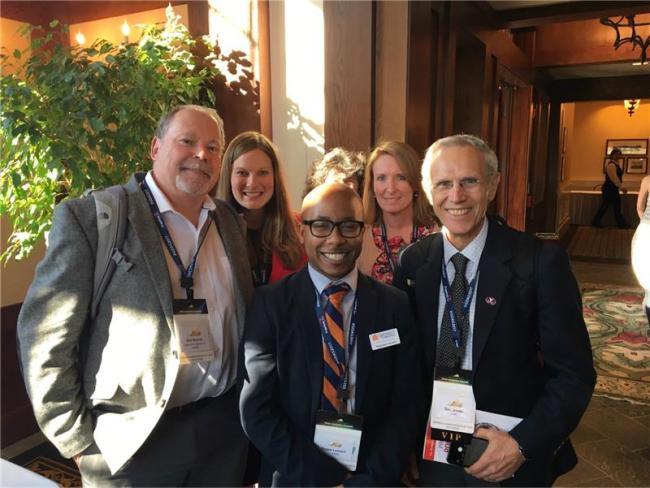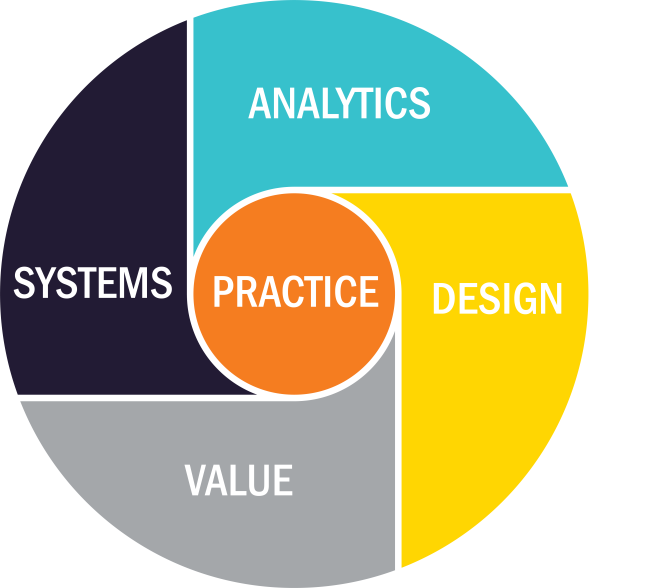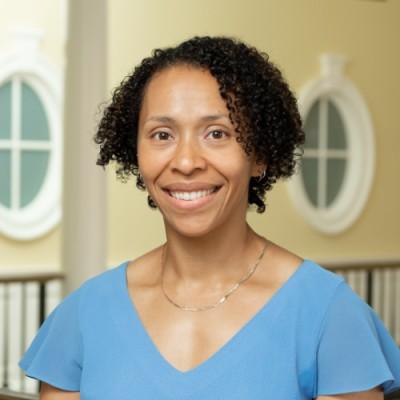Master's programs
While the master’s program continued to attract a considerable number of applicants, it required students to study in residence at UVA.
This was certainly an appealing aspect to many, but for others, this simply wasn’t feasible for any number of reasons. Some were not in a position to move to Charlottesville. Others couldn’t leave their jobs for a year.
Cathy Anderson had collaborated with Don Brown and Arlyn Burgess during the early days of the Data Science Institute to deliver custom executive education programs while she was at UVA’s School of Continuing and Professional Studies.
A couple of years later, in January 2017, Anderson joined the Data Science Institute team as the Director of Executive and Continuing Education, with the mission of expanding the Institute’s offerings to new audiences.
“Don had been interested in venturing into the online space for a while,” Anderson said. “And that’s, of course, most of what the School of Continuing and Professional Studies did, so I looked forward to applying my experience at the Institute.”
Anderson was excited for the opportunity to expand data science education to new markets of students, and soon, attention turned to the idea of creating an entirely online master’s program.
The Data Science Institute, though, was still a lean operation, and establishing an online degree program would require extensive work, including marketing and student recruitment.
Anderson and others realized they would need an outside vendor to turn their vision into a reality and enlisted Noodle Partners, a firm that specializes in assisting universities with these very needs.
Beyond promoting the program, the institute, which did not have its own faculty, had to earn buy-in from other departments, many of whom, Anderson noted, were “very stretched” in terms of resources.
“There was a lot of going around and meeting with people, talking about what we were hoping to do, and listening to their concerns” she said.
With the provost’s office fully supportive, the online data science master’s degree was announced in fall 2018, with the program launching the following summer, one of the first of its kind at UVA.
Given the unique challenges that students in the online program would face, courses had to be designed to accommodate the needs of students and the extraordinary time demands that many faced.
“They need to really know what to expect for planning purposes because many juggle full-time jobs and families,” Anderson said when it came to assignments, tests, and due dates. She also noted that faculty members would record lessons and other content, which allowed students to view them when their schedules permitted.
While this required many instructors to adjust their teaching styles, the payoff was considerable, as data science education at UVA would now be accessible to a much wider pool of talented and passionate students, many of whom would no longer have to take a year off from work or uproot their families to pursue their goals.
“She never gave up,” Brown said of Anderson. “And sure enough, we got the program.”
“Everyone felt really good about this new student population and being able to serve them,” said Anderson. “They’re just so thankful that they have the opportunity.”
That’s true, Bourne added, “but there were moments when we were stretched so thin. I feared we would not be able to deliver classes.”
Indeed, while the expansion of programs and the ambition of the work of the Data Science Institute — and later the School of Data Science —brought success, it did not come without a cost. Resource limitations amid increasing responsibilities would continue to loom large and weigh on the team as the years went on and ambitions expanded.
On Sept. 18, 2019, the School of Data Science became the University of Virginia’s 12th school and the first school of data science in the nation, a moment years in the making that positioned UVA as a national leader in this rapidly growing field.
Guided by the aim of creating a collaborative culture and founded on the promise of interdisciplinary research, it would become the School Without Walls that Phil Bourne and others had envisioned.
Bourne, director of the Data Science Institute, would become the first Stephenson Dean of the School of Data Science, which was made possible by an endowment funded by commitments from Jaffray Woodriff and the Quantitative Foundation, UVA’s Bicentennial Professors Fund, and a newly announced $3 million gift from Scott and Beth Stephenson, which matched an earlier donation of that amount that they made in 2014.
The Stephensons had been longtime supporters of the University, including the Data Science Institute. In a 2019 news announcement about the gift, Scott Stephenson, who continues to serve as chairman of the School of Data Science advisory board, said, “The expanded scale of the School will help fulfill the vision of data science as a domain of knowledge reaching across all parts of the University.”
So, what was one of the top agenda items for a new school dedicated to data science?
“One of the first things we did was really to step back, a bit ironically in a way, and say to ourselves, what is data science?” said Bourne, noting that 10 different people might offer up 10 different definitions.
“We felt it would be really important if we all started off, to some degree, on the same page,” Bourne added.
Out of these discussions came the 4 + 1 Model, an effort to better define data science that was heavily influenced by Rafael Alvarado, an associate professor.
The model lays out four areas of data science — Value, Design, Systems, and Analytics — connected by a fifth area, Practice, which are the activities that occur when expertise from each of the four areas are brought together.
Using that model, the School offered up this definition of data science:
“Data science is a convergent field that integrates expertise from four broad areas of knowledge — value, design, systems, and analytics — with the purpose of extracting information, insight, and value from data in a responsible, authentic, and actionable manner. Data science concerns more than data analysis — it includes the broad and directly relevant contexts in which data analytic work takes place.”
The 4 + 1 Model continues to serve as a cornerstone of the School of Data Science both in education and research.
While in college in Ontario, Melissa Phillips knew she wanted to be a math teacher. “I love working with students,” she said.
“Learning new things is something that I always strive toward, and then being able to impart that knowledge to others and care about people as people who are trying to grow and helping them do that is really rewarding to me,” she added.
Phillips’ journey is reflective of those taken by many in the field, including a number of students at UVA, in that her path didn’t go in a straight line or check any predetermined boxes about what one needs to do to pursue a career in data science.
After a brief stint as a teacher, she went back to school to get a master’s degree in theological studies. She then moved to Edinburgh, Scotland, in 2007 while her husband was pursuing a doctorate degree, then to Charlottesville in 2010 where she resumed her career as a math educator.
While teaching at an independent school in Charlottesville, she decided to explore professional development opportunities in computer science so that she could incorporate it into her math curriculum. Soon, she was teaching her students how to code. It was at this time that she attended a math competition where a data scientist delivered keynote remarks.
“I hadn’t heard of data science until that point,” she said. The speaker described how data science combined elements of computer science, math, and domain knowledge.
“And I thought, that’s exactly what I want,” Phillips said. She discovered the graduate program at what was then still officially the Data Science Institute and enrolled in the residential master’s program in fall 2019.
She found the program and her cohort to be a great fit, and she appreciated the opportunity that her coursework provided to work closely with her classmates.
“One thing I loved about the program is it’s very collaborative, and every class had some kind of teamwork project,” Phillips said. “And so you really have the opportunity to bring your skill set and to allow other people to shine too.”
After graduating she would join GA-CCRi, a firm that works with government agencies and private sector clients to solve problems through data science and other techniques. She continues to work there now.
She encourages other students to consider the field that has become her career. “If you’re driven to find meaning in the world, then I think that data science is one way to get there.”
Phillips opted for the residential master’s program in 2019, in part because forging in-person friendships in class was important to her. While her experience at the School of Data Science began within the walls of classrooms, it would not end that way.


